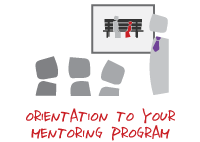Posted by jmeyer on October 4, 2022
Orientation and training are often used interchangeably. Yet, they are different experiences that serve different purposes. In the context of a mentoring program, orientation introduces volunteers to a new experience, whereas training teaches new skills and influences attitudes and beliefs that are supportive of the mentoring relationship. An orientation covers the essential historical information about your mentoring program, mentoring guidelines, the population of mentees involved, the relevant policies and procedures, a clear and concise program mission statement, and the desired goals.

Orientation should include basic ethics training and situational dilemmas such as whether mentors are allowed to drive their mentees in their vehicle. This situation raises many questions like, under what conditions the mentor can drive a mentee, what documentation (e.g., driver’s license and insurance) must be on file with the mentoring program if driving the mentee is allowed, and whether the mentee needs to use a car seat. Even programs that do not think mentors will have an opportunity to drive their mentee should have a policy explicitly stating that driving a mentee is not permitted and include that in their mentor orientation.
The Elements of Effective Practice for Mentoring, 4th Edition, the best practice guide for youth mentoring programs, provides a list of topics that should be addressed in pre-match mentor orientation relevant to protecting the mentee, mentor, mentee’s family, and the mentoring program.
The list of topics includes, ethics training, appropriate physical contact, required contact with the mentoring program, approved activities, mandatory reporting requirements, confidentiality and anonymity, digital and social media use, overnight visits and out of town travel, spending money on mentee and mentoring activities, transportation, emergency and crisis situation procedures, health and medical care, discipline, substance use, firearms and weapons, inclusion of others in match meetings, photo and image use evaluation and use of data, and grievance procedures.
If your program does not have policies or procedures that address these topics, then it is critical to develop those policies and determine how to communicate with program participants about your program’s requirements. Orientation on these topics for all individuals involved in the mentoring program will help ensure that they are informed and have a common understand of what is required of participants
To learn more about how mentoring programs are conducting mentor orientation, researchers at Mentoring Central conducted a survey of 70 mentoring program staff members representing 43 mentoring programs that included a series of questions about the program’s pre-match mentor orientation. Given the importance of mentor orientation, and the mentoring guidelines for preparing new volunteers to mentor in the program, 83% of program staff reported that mentors are required to complete a pre-match orientation that provides an overview of the program and rules.
To dig a bit deeper into how programs are conducting mentor orientation, and how it reflects the mentoring guidelines, several questions asked about orientation logistics. For example, most programs – 93% – reported the orientation was conducted in-person. It is worth noting that this survey was conducted before the Covid-19 pandemic, and this would likely be different now given that many mentoring programs have become more comfortable utilizing virtual tools to help run their program.
Programs staff were divided in whether the orientation session was conducted separately from pre-match training or not, with 52% reporting that it was separate and 48% reporting it was not separate from the mentor training. In terms of whether mentor orientation was conducted individually or in a group, a slight majority of participants (55%) indicated their orientation was conducted in-person in a group setting and 45% indicated they provide orientation on an individual basis. When asked about the length of the orientation session, the most frequently reported length of mentor orientation was 2 hours.
Two questions asked survey participants about the mentor orientation materials to gather information about where they get their orientation content and what it is like. A majority (62%) of program staff reported that mentor orientation materials were created specifically for their organization. This is not surprising given that every mentoring program is unique and has its own unique history and rules. Program staff reported using many different pedagogical methods in their mentor orientation, with a majority reporting they used question and answer sessions, small and large group discussions, provided handouts, conducted interactive activities, and used a manual.
Results from this survey can give your mentoring program some information about how it compares to other programs in the mentoring field. Together, the survey and the Elements of Effective Practice for Mentoring provide you with guidance on what topics should be fully addressed in your orientation, so you are not falling short of what is necessary to have a high-quality mentoring program.
You may have your mentor training covered, but are you addressing all the information your mentors need to know about your program and your risk management policies to protect mentees’ physical and emotional safety? Maybe you are looking to refresh your mentor orientation, so it is more comprehensive and engaging. Mentoring Central has a solution to help you cover all the critical topics for mentor orientation.

Mentoring Central’s new product ‘Orientation to Your Mentoring Program’ Toolkit is a comprehensive mentor orientation program. The mentoring toolkit includes a PowerPoint presentation that you can customize to fit your program, plus a detailed and easy-to-use manual that will help instructor’s guide mentors through the orientation.
The mentoring toolkit includes engaging scenarios that will prompt discussion and help your mentors better understand your program’s policies and procedures related to topics such as transportation, discipline in the mentoring relationship, substance use before and during meetings with their mentee, overnight visits, and social media rules in your program.
In line with the current practices of mentoring programs, the ‘Orientation to Your Mentoring Program’ Toolkit takes about 2 hours to conduct. It includes small and large group discussion and interactive activities and a manual. The orientation could be conducted live, in-person or virtually using a web conferencing application such as Zoom.
Every effective mentoring program is unique. Your program’s rules, policies, and procedures are specific to your program, guided in part by your program’s mission, your programs, mentee population, and insurance requirements. This calls for a unique orientation solution for your mentors.
Learn more about the ‘Orientation to Your Mentoring Program’ Toolkit.